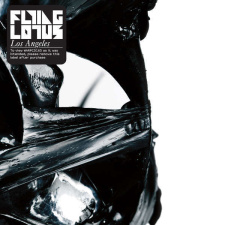
Flying Lotus
Los Angeles
(Warp; 2008)
By Colin McGowan | 7 July 2008
Nuance feels dead. Flip around, drive around, browse around; it becomes obvious rather quickly: yelling is the new talking, XL’s the new L, fluorescent’s the new earth tone. It seems the great American fascination with train wrecks (big ones!) has bred a generation of them, babies weaned on Nesquik—names pronounced with exclamation points attached—whose existence seems to consist of perpetual stimulation, or at least the pursuit of such a state, through an expanding of cultural borders beyond audacity and into oblivion. It’s a lot to wrap your head around but not hard to acknowledge—damning logic, but still accurate, how indulgence subs in as construction materials for endless frustration and circular arguments. Like: Fall Out Boy are not the Smiths, but in some sense they’re generational equivalents. Or: Flying Lotus, recently signed to Warp, can make an album both touchingly intimate and grotesquely huge (weird), at the mercy of some infuriating zeitgeist that demands excess and insularity as if that is exactly the next step any DJ or electronic or self-respecting artist should take, ad hoc.
“Auntie’s Lock/Infinitum” sympathizes with such exhaustive confusion. An unsettling tribute to Flying Lotus’s aunt and mentor Alice Coltrane, the final track on his sophomore full-length kills the lights and allows darkness’s lonely pangs to resonate. Laura Darlington narrates in unintelligible syllables that consume the solitary, alternating blips surrounding her desolate voice. Somber in its sobriety—the composition is almost entirely bereft of any additional layers of sound—it may be Flylo’s most touching document to date, a remarkable humanity coming through its hypnotic pulses. And a testament to Lotus’s versatility, then, is how the album is first served up in all its interstellar oddity like a celestial ice cream scoop via the Big Dipper, how “Brain Feeder” floats in, seemingly constructed from Martian atmosphere. Both tracks are firmly rooted in the minimalistic techniques familiarized most on Lotus’s 1983 (2006), but that minimalist ethos is amplified here as Lotus further explores the utilization of empty space in his music.
While both the opening and closing tracks on Los Angeles delve further into sparse composition, the songs sandwiched between them diverge from this formula significantly, at times ramping up the density to dizzying proportions. The immediacy of “GNG BNG” is manifested through its impetuous transformations. It morphs from tribal stomp to Indian-tinged extravagance to a grimy, Roots-esque jam session over the course of three-point-five minutes; these shifts aren’t subtle: less like continental drift, more like seismic cataclysms. All of this is aided in part by Lotus’s ever-expanding ability (and willingness) to employ a variety of percussion in his compositions: drums that leap about like frenzied youth pogo-sticking after an ice cream truck (“Melt”), that tap the eardrum like muffled, intimate whispers (“Golden Diva”), that exhaust my reservoir of overwrought metaphors pawing to capture an opulence.
In many ways, Los Angeles can be considered a sheltered but ultimately vulnerable exploration of white space vs. white noise, how each one staunchly defies and impregnates the other. But the ground upon which these two binaries converge is Lotus’s knack for subtlety. The bookends of the record quite obviously thrive on this talent and buried beneath the bustling layers of chaos found on the more frantic tracks are slight alterations and accents, replayable easter eggs and goodies for the discerning return. Lotus isn’t simply throwing blankets of sound around recklessly but constructing carefully-stitched quilts. “Sleepy Dinosaur”’s flitting, off-kilter electronics yield playful laser effects and jazzy keyboards; a buzzing undertone serves as “Robertaflack”’s quiet foundation. These minute elements work together to form a Pointillist tapestry of sorts, each composition impressively constructed from minor contributions.
Perhaps the rabidity—and hyperbole—of my reaction towards Los Angeles is a product of synergy between my fascination and my adoration for it. It could easily be pegged a “transitional album,” as it falters a bit when Lotus mines similar sounds too frequently in the middle of its duration, but it is undeniably moving the producer’s sound somewhere. The real question is where, exactly, because different selections from the album suggest opposing directions. Assured in its fastidiousness, with enough schizophrenia to make whiplash a factor, Los Angeles cements Flying Lotus’s status as the best producer in a burgeoning scene bursting with talent, categorization eluding whatever scene that may be, whatever it means to be a producer.





